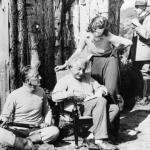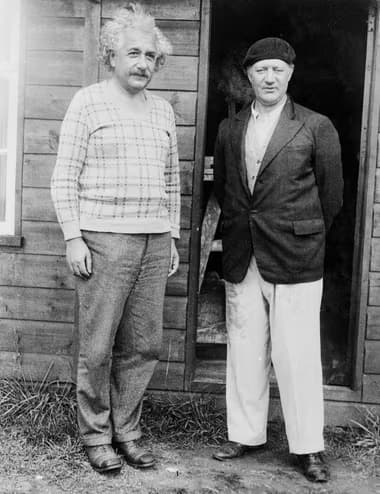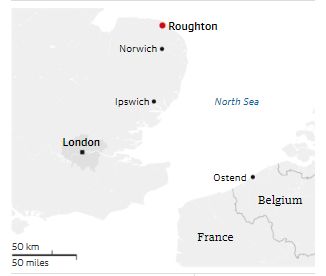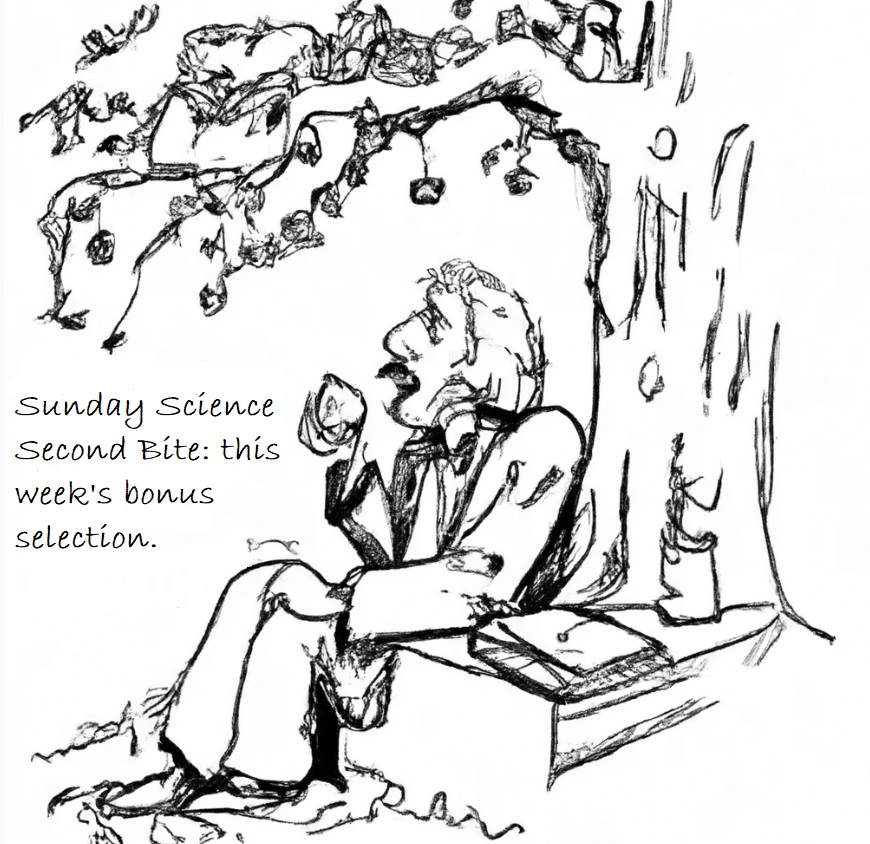Sunday Science: Einstein on the Run: How the World’s Greatest Scientist Hid From Nazis in a Norfolk Hut

In September 1933, a humble wooden hut on a secluded Norfolk heath became the improbable location of one of the most important hideouts in history.
Nearly a century later, the rarely told story of the three weeks Albert Einstein spent holed up in a heathland bothy, on the run from Nazi assassins, has been turned into an unusual type of docudrama.
Using Einstein’s own words, Netflix’s Einstein and the Bomb will shine a light on how the celebrated German Jewish scientist’s brief sojourn on Roughton Heath came at a crossroads in his life – and, consequently, changed the course of history.
“It was only as we looked closer that we realised quite what a seismic moment in his life it was,” said the screenwriter Philip Ralph, a “verbatim specialist” who used only Einstein’s actual speeches, letters and interviews to script the theoretical physicist’s dialogue.

“What came out from my research was that it was, in many ways, the most important turning point in Einstein’s life.”
By then, Einstein was public enemy No 1 in Germany. In May 1933, a brochure entitled Jews Are Watching You accused Einstein of “lying atrocity propaganda against Adolf Hitler”. Under his picture, it stated: “Not yet hanged.”
In September, after German secret agents assassinated the Jewish philosopher Theodor Lessing in Czechoslovakia, the Nazis – who had already stolen Einstein’s savings, raided his summerhouse, ransacked his Berlin apartment and taken his violin – offered a reward of at least £1,000 for his murder.
The next day, Einstein yielded to his wife Elsa’s pleas to leave her in the holiday home they had been renting near Ostend in Belgium and flee to England by sea. He would never set foot on continental Europe again.
“Prior to that point, Einstein had been an avowed, passionate advocate for non-violence and pacifism. But at the end of that three weeks, he gave a speech to 10,000 people at the Royal Albert Hall where he effectively said there is an existential threat to European civilisation, and we will have to fight it,” said Ralph.
In 1939, fearing that the Nazis would get there first, he successfully petitioned President Franklin Roosevelt to accelerate the US development of a nuclear bomb, a decision recently depicted in Christopher Nolan’s blockbuster film Oppenheimer.
It was during Einstein’s stay on the remote heath, protected by armed guards, that he first came to the realisation that he must publicly use his influence in society to speak out against the Nazis and call on world leaders to act, Ralph said. “We chose the title Einstein and the Bomb because it was the shift in his thinking that took place over that three-week period in Norfolk that directly led him to put his name to that letter to Roosevelt.”

The small Norfolk bothy belonged to a trusted acquaintance, the anti-fascist Conservative MP and first world war naval commander Oliver Locker-Lampson, who offered it to Einstein as a place of refuge under his protection.
Earlier that year, Locker-Lampson had highlighted Einstein’s situation in parliament and introduced an ultimately unsuccessful private member’s bill to “extend opportunities of citizenship for Jews resident outside the British empire”.
Perhaps to draw attention to Einstein’s plight, members of the press were somewhat incongruously invited by Locker-Lampson to the secret hideout and allowed to interview and photograph the famous Nobel prizewinner.
It was a press call that, given the very real threat to Einstein’s life, appalled a reporter at the Observer. “England is not a very good place to hide in,” the newspaper’s diarist reported on 17 September 1933. “Dr Einstein, who has come here to escape Nazi persecution, finds his wooden hut photographed in the papers, with full indications of locality, and Cromer Council considers the question of presenting an address. Germany, I suppose, is presumed to be looking the other way.”
When Einstein agreed to give the speech at a ticketed event at the Royal Albert Hall to raise money for Jewish academic refugees from Germany, his decision was criticised by the Daily Mail. The editorial, which claimed to pity and “have every sympathy with the German Jews as such”, called on Einstein to “stop this injudicious agitation in this country against the Nazi regime”.
Two days after giving his historic speech, calling on all nations to “resist the powers that threaten intellectual and individual freedom … which our forefathers won through bitter struggle”, Einstein left for the US and the newly formed Institute for Advanced Study in Princeton University. Elsa successfully joined him en route and he spent the rest of his life in exile, where he wrote affidavits recommending the US offer visas for Jews fleeing Nazi persecution and helped to found the world’s first refugee aid agency, the International Rescue Committee.
Donna Ferguson is a multiple award-winning freelance journalist, mostly @observeruk and @guardian. Committee member of Women in Journalism @WIJ_UK. Here work has appeared in The Guardian, Business Insider, Daily Mail, MSN (US), MSN Australia, MSN Canada, MSN Ireland, MSN UK, The Independent, The Mail on Sunday, The Mirror UK and more.
Message from Betsy Reed, Editor, Guardian US:
I hope you appreciated this article. Before you move on, I wanted to ask if you would consider supporting the Guardian’s journalism as we enter one of the most consequential news cycles of our lifetimes in 2024.
With the potential of another Trump presidency looming, there are countless angles to cover around this year’s election – and we'll be there to shed light on each new development, with explainers, key takeaways and analysis of what it means for America, democracy and the world.
From Elon Musk to the Murdochs, a small number of billionaire owners have a powerful hold on so much of the information that reaches the public about what’s happening in the world. The Guardian is different. We have no billionaire owner or shareholders to consider. Our journalism is produced to serve the public interest – not profit motives.
And we avoid the trap that befalls much US media: the tendency, born of a desire to please all sides, to engage in false equivalence in the name of neutrality. We always strive to be fair. But sometimes that means calling out the lies of powerful people and institutions – and making clear how misinformation and demagoguery can damage democracy.
From threats to election integrity, to the spiraling climate crisis, to complex foreign conflicts, our journalists contextualize, investigate and illuminate the critical stories of our time. As a global news organization with a robust US reporting staff, we’re able to provide a fresh, outsider perspective – one so often missing in the American media bubble.
Around the world, readers can access the Guardian’s paywall-free journalism because of our unique reader-supported model. That’s because of people like you. Our readers keep us independent, beholden to no outside influence and accessible to everyone – whether they can afford to pay for news, or not. If you can, please consider supporting us just once from $1, or better yet, support us every month with a little more. Thank you.

What Is a Species, Anyway?
By Carl Zimmer
Some of the best known species on Earth may not be what they seem.
New York Times
February 19, 2024
